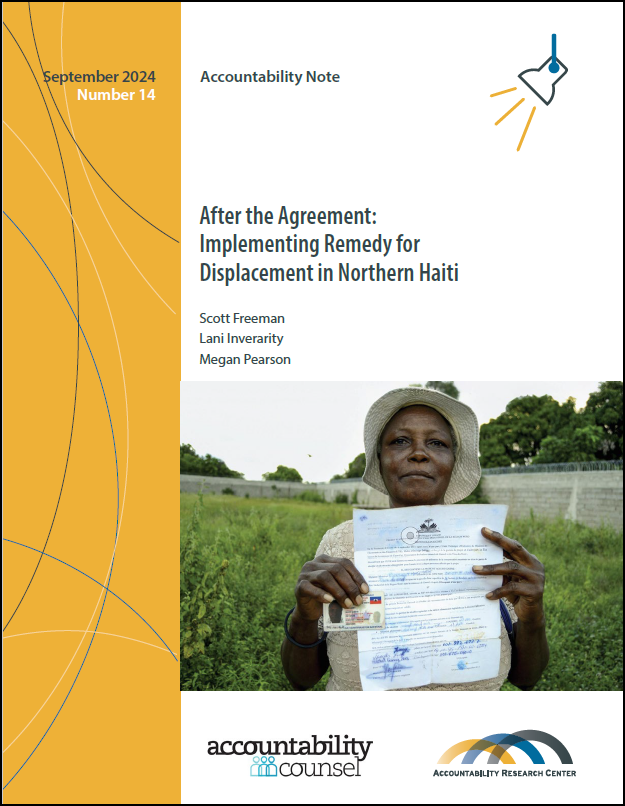
After the Agreement: Implementing Remedy for Displacement in Northern Haiti
Date: September 2024
Author(s): Scott Freeman, Lani Inverarity, Megan Pearson
Publication type: ARC Accountability Note
Published by: Accountability Research Center and Accountability Counsel
In January 2011, more than 400 families in northeast Haiti were evicted from their agricultural land to make way for the Caracol Industrial Park (CIP), a large industrial textile facility principally financed by the Inter-American Development Bank (IDB) and the US government.
This Accountability Note chronicles the Haitian families’ remarkable path to pursuing remedy for their displacement. Against all odds, they organized, sought international support for their case, and, using the independent accountability mechanism (IAM) of the IDB, ultimately negotiated an agreement with the IDB and the Haitian government to restore their livelihoods. But their struggle did not end there.
Much of the fight for remedy occurred after signing the agreement—a reality often under-acknowledged by accountability advocates. Support from local and international advocates has been critical to getting even partial implementation of the agreement. From the outset, the Haitian families’ chances of success were slim: few IAMs have the capacity or mandate to facilitate any remedy. Moreover, the Caracol case represents an extremely rare instance where a displaced community has successfully used an IAM to negotiate for replacement land. Still, for many families, delays in receiving remedy lasted for years, increasing suffering and exacerbating the economic and social losses that come with losing land. Monitoring and advocacy have been necessary for the six years following the signing of the agreement. Because of that, many of the families eventually received some compensation—including (for some) land.
Although reaching an agreement to address harm is often the goal of an accountability mechanism process, this Note highlights the struggle that unfolds after the agreement is signed. Ensuring that remedy is actually delivered requires continual vigilance and advocacy. The Note provides key lessons for communities and advocates hoping to
secure remedy through dispute resolution at IAMs:
- Lesson 1: A signed agreement for remedy is not the end of the process, but the beginning of another struggle.
- Lesson 2: Monitoring and continued advocacy are critical to getting remedy agreements implemented.
- Lesson 3: Remedy agreements must account for the possibility of challenges to implementation
Even though Haiti presents a challenging political and economic environment in which to implement a remedy agreement, the lessons of this case are not unique to Haiti. As development banks increasingly operate in contexts of fragility and crisis, similar hurdles to remediation are likely to occur elsewhere.
Scott Freeman is an Assistant Professor at the School of International Service at American University. He is an anthropologist and conducts ethnographic fieldwork on aid, the environment, and labor in the Haitian countryside. His writing broadly focuses on the social and economic issues that aid bureaucracy creates in areas of implementation. He holds a PhD in applied anthropology from Columbia University.
Lani Inverarity is the Director of Programs and Strategy at Accountability Counsel (AC). Prior to this role, Lani spent more than five years providing direct support to hundreds of farmers in Haiti displaced by the construction of the Caracol Industrial Park. She has also supported communities in Colombia, Kenya, Mongolia, and Ukraine. Lani received a Masters in Law from Yale Law School and is admitted as a Barrister and Solicitor of the High Court of New Zealand.
Megan Pearson is a Policy Associate at Accountability Counsel (AC), a non-profit that supports communities around the world to defend their human rights and environment through accountability offices at development finance institutions. She focuses on strengthening financial institutions’ policies on remediation for negative environmental and social impacts associated with their investments. Prior to joining AC, she worked at the Institute for Justice and Democracy in Haiti. She received her J.D. from Yale Law School and is a member of the District of Columbia Bar.
